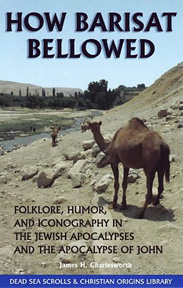Multimedia • Reference • Religion • Travel |
 How Barisat Bellowed: Folklore, Humor, and Iconography in the Jewish Apocalypses and the Apocalypse of John Dead Sea Scrolls and Christian Origins Library Volume 3 James H. Charlesworth
Description From The Publisher: Do you think that a funny story is more important than shelter or sex? Many experts do. Humor and storytelling are so important to the human psyche that they even penetrate literary works dealing with serious subjects. This book examines the origin of Jewish Apocalyptic literature – the literature of groups who were convinced that the End was near. As we approach a new millennium, interest in apocalyptic literature is on the increase. For Christians, this should not be a temporary fad. Since Christianity began as an apocalyptic movement within Judaism, the understanding of ancient apocalypses is important to the understanding of Early Christianity. Professor Charlesworth points out that many stories in Jewish apocalyptic literature evolved from conversations around the campfire, the hearth, or anywhere people would customarily gather to relax and talk. Folklore and humor – and the physical relaxation and psychological release from laughing – served as a catharsis from physical labors and political oppression. Another influence on these stories was the prevalence in that ancient culture of images of winged beasts and demons, which became models for the beasts and demons in the stories. The only way to understand early Jewish and Christian apocalypticism is to base our reflections on the content and setting of the texts, rather than on preconceived notions of what they might have to say about the beginning of the third millennium. We should listen to what the ancients had to say to theirt own contemporaries. When we do we may hear a voice from above. Reader's Index Send us your favorite quotes or passages from this book. About the Author James H. Charleswroth is the George L. Collard Professor of New Testament Language and Literature and the editor of the Dead Sea Scrolls Project at Princeton Theological Seminary. He has written many books, including the highly acclaimed Jesus Within Judaism, and edited The Old Testament Pseudepigraphia (Volumes 1 and 2). He lives in Princeton, New Jersey. Table of Contents Customer Reviews Write your own online review. Look for Similar Books by Subject | |||||||
Copyright ©1996-2006 CenturyOne Bookstore. All Rights Reserved. All prices subject to change and given in U.S. dollars. Your purchase from CenturyOne.com will assist the CenturyOne Foundation in providing funding for various archaeological and research projects which seek to provide more information about the period of the First Century C.E., the origins of Christianity and the world of the Bible in general. All materials contained in http://www.centuryone.com are protected by copyright and trademark laws and may not be used for any purpose whatsoever other than private, non-commercial viewing purposes. Derivative works and other unauthorized copying or use of stills, video footage, text or graphics is expressly prohibited. |

